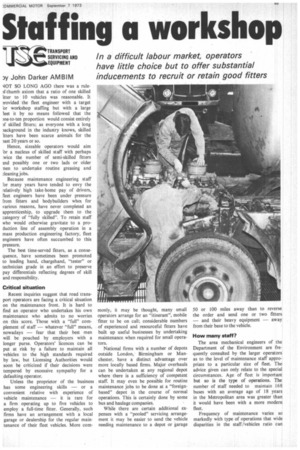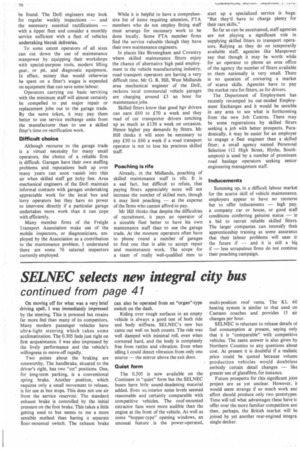Staffing a workshop
Page 71

Page 72

If you've noticed an error in this article please click here to report it so we can fix it.
Dy John Darker AMBIM
+TOT SO LONG AGO there was a rulei-thumb axiom that a ratio of one skilled itter to 10 vehicles was reasonable. It govided the fleet engineer with a target br workshop staffing but with a large leet it by no means followed that the me-to-ten proportion would consist entirely )1* skilled fitters; as everyone with a long mckground in the industry knows, skilled itters have been scarce animals for the )ast 20 years or so.
Hence, sizeable operators would aim 'or a nucleus of skilled staff with perhaps .wice the number of semi-skilled fitters and possibly one or two lads or older nen to undertake routine greasing and :leaning jobs.
Because maintenance engineering staff 'or many years have tended to envy the relatively high take-home pay of drivers, Fleet engineers have been under pressure From fitters and bodybuilders who for various reasons, have never completed an apprenticeship, to upgrade them to the :ategory of "fully skilled". To retain staff who would otherwise gravitate to a production line of assembly operation in a mass production engineering factory, fleet engineers have often succumbed to this pressure.
The best time-served fitters, as a consequence, have sometimes been promoted to leading hand, chargehand, "tester" or technician grade in an effort to preserve pay differentials reflecting degrees of skill and responsibility.
Critical situation Recent inquiries suggest that road transport operators are facing a critical situation on the maintenance front. It is hard to find an operator who undertakes his own maintenance who admits to no worries on this score. Those with a "full" complement of staff — whatever "full" means, nowadays — fear that their best men will be poached by employers with a longer purse. Operators' licences can be put at risk by a failure to maintain all vehicles to the high standards required by law, but Licensing Authorities would soon be criticized if their decisions were tempered by excessive sympathy for a defaulting operator.
Unless the proprietor of the business has some engineering skills — or a convenient relative with experience of vehicle maintenance — it is rare for a firm operating up to five vehicles to employ a full-time fitter. Generally, such firms have an arrangement with a local garage or dealership for the regular maintenance of their fleet vehicles. More corn
monly, it may be thought, many small operators arrange for an "itinerant", mobile fitter to be on call; considerable numbers of experienced and resourceful fitters have built up useful businesses by undertaking maintenance when required for small operators.
National firms with a number of depots outside London, Birmingham or Manchester, have a distinct advantage over more locally based firms. Major overhauls can be undertaken at any regional depot where there is a sufficiency of competent staff. It may even be possible for routine maintenance jobs to be done at a "foreignbased" depot in the course of normal operations. This is certainly done by some bus and haulage companies.
While there are certain additional expenses with a "pooled" servicing arrangement it may be easier to send the vehicle needing maintenance to a depot or garage 50 or 100 miles away than to reverse the order and send one or two fitters — and their heavy equipment — away from their base to the vehicle.
How many staff?
The area mechanical engineers of the Department of the Environment are frequently consulted by the larger operators as to the level of maintenance staff appropriate to a particular size of fleet. The advice given can only relate to the special circumstances. Age of fleet is important but so is the type of operations. The number of staff needed to maintain 168 buses with an average age of 18 years in the Metropolitan area was greater than it would have been with a more modern fleet.
Frequency of maintenance varies so markedly with type of operations that wide disparities in the staff/vehicles ratio can be found. The DoE engineers may look for regular weekly inspections — and the necessary essential rectifications — with a tipper fleet and consider a monthly service sufficient with a fleet of vehicles undertaking biscuit deliveries.
To some extent operators of all sizes can cut down the use of maintenance manpower by equipping their workshops with special-purpose tools, modern lifting gear, _ or pit, and diagnostic equipment. In effect, money that would otherwise be spent on a fitter's wages is expended on equipment that can save some labour.
Operators carrying out basic servicing with the minimum staff will almost certainly be compelled to put major repair or replacement jobs out to the garage trade. By the same token, it may pay them better to use service exchange units from the manufacturer than to use a skilled fitter's time on rectification work.
Difficult choice Although recourse to the garage trade is a virtual necessity for many small operators, the choice of a reliable firm is difficult. Garages have their own staffing problems and reputations built up over many years can soon vanish into thin air when skilled staff get itchy feet. Area mechanical engineers of the DoE maintain informal contacts with garages undertaking appreciable work for the local bus and lorry operators but they have no power to intervene directly if a particular garage undertakes more work than it can cope with efficiently.
Many member firms of the Freight Transport Association make use of the mobile inspectors, or diagnosticians, employed by the Association as a contribution to the maintenance problem. I understand there are some 76 salaried inspectors currently employed. While it is helpful to have a comprehensive list of items requiring attention, FTA members who do not employ fitting staff must arrange for necessary work to be done locally. Some FTA member firms find the service valuable though they have their own maintenance engineers.
In places like Birmingham and Coventry where skilled maintenance fitters enjoy the chance of alternative high paid employment in the vehicle manufacturing industry, road transport operators are having a very difficult time. Mr G. R. Hill, West Midlands area mechanical engineer of the DoE. reckons local commercial vehicle garages are charging around £3 an hour for maintenance jobs.
Skilled fitters know that good hgv drivers can earn £60 to £70 a week and they read of car transporter drivers notching up as much as £130 a week on occasion. Hence higher pay demands by fitters. Mr Hill thinks it will soon be necessary to pay £50 to £60 a week if a road transport operator is not to lose his precious skilled staff.
Poaching is rife Already, in the Midlands, poaching of skilled maintenance staff is rife. It is a sad fact, but difficult to refute, that paying fitters appreciably more will not increase the number of skilled men, though it may limit poaching — at the expense of the firms who cannot afford to pay.
Mr Hill thinks that despite the difficulties of recruitment, it pays an operator of a sizeable fleet better to have his own maintenance staff than to use the garage trade. At the moment operators often have to phone round a number of garages to find one that is able to accept repair and maintenance work. The scope for a team of really well-qualified men to start up a specialized service is huge. "But they'd have to charge plenty for their rare skills."
So far as can be ascertained, staff agencies are not playing a significant role in supplying skilled fitters to transport operators. Relying as they do on temporarily available staff, agencies like Manpower say that though it may be worth while for an operator to phone an area office of the agency the number of fitters available to them nationally is very small. There is no question of cornering a market of scarce skills. Agencies have to pay the market rate for fitters, as for drivers.
The Department of Employment has recently revamped its out-moded Employment Exchanges and it would be sensible in any area to see what is forthcoming from the new Job Centres. There may be some registrations by skilled fitters seeking a job with better prospects. Paradoxically, it may be easier for an employer to engage a fleet engineer than a skilled fitter; a small agency named Personnel Selection (12 High Street, Hythe, Southampton) is used by a number of prominent road haulage operators seeking senior engineering management staff.
Inducements Summing up, in a difficult labour market for the scarce skill of vehicle maintenance, employers appear to have no recourse but to offer inducements — high pay, a company car or house, or good staff conditions conferring genuine status — in a bid to recruit reliable skilled fitters. The larger companies can intensify theit apprenticeship training as some assurance that their labourproblems will ease in the future if — and it is still a big if — less scrupulous firms do not continue their poaching campaign.








































































































































